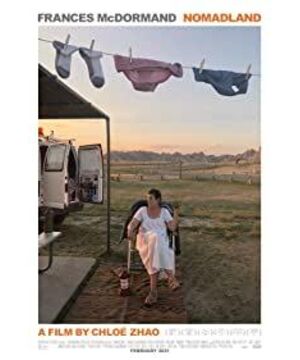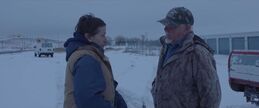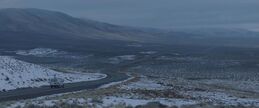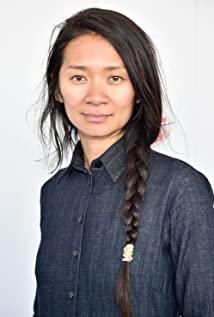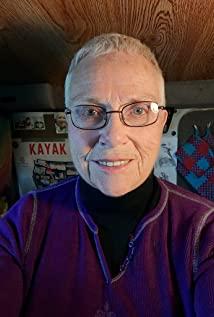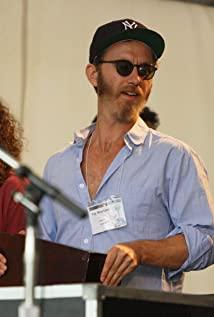After watching Chloe Zhao's new work "A Place of Nowhere" and admiring her narrative ability of the lens, she seems to like to photograph the vast wilderness. In the morning and dusk, the brightness of the light fits well with the story of the people in the play. The same goes for "Knight". But this one is obviously more touching. Just like Woody Allen, who can smoothly control urban themes, Zhao Ting seems to have a natural ability to control these wilderness and endow nature with a humanistic spirit. In fact, the feeling of desolation is the same as the loneliness of the hustle and bustle of the city. Regardless of the environment, it is ultimately to illuminate people.
"A Place to Nowhere" talks about the "nomadic life" of a group of elderly caravans, this is the baby boom generation, Zhao Ting said that she does not understand them, and it is very different from young people traveling in caravans. The starring Francis should be more understanding of the same generation, so she contributed the most to this play. Without the proper actor, the play might not be so exciting. I don't know how others understand it. I think this is a generation of old people who have been forced on the road by the globalization they experienced in their prime. I was particularly impressed with the jobs Fern did while wandering in the wilderness: Amazon warehouse clerk, large quarry worker, fast food restaurant clerk. Seeing Amazon’s endless warehouse in the movie, where people are like ant camps in exchange for food and clothing, really makes me shudder. This is really a horror movie scene in our new era.
Although at the end of the movie, the organizers of this group of nomads talked affectionately about their son who died five years ago, and talked about doing all this and helping passers-by, all to commemorate his son, and hope they will meet again on the road one day, This period of restrained sentimentality can't change my understanding of this nomadic life--they take their cars as their home and the whole world as their home. There are some psychological factors, but they are more forced by life. Fern has no children. After the death of her husband, her sister--a typical middle-class American whose husband is a real estate agency--invited her to live with her many times. She did not want to go. When her RV needed to be repaired and there was no money to pay for the repair, her sister said I can lend you money, but you have to come to my house. She prefers to transfer money and has repeatedly emphasized: I will pay you back. Later, she went to her sister's house, stayed for a day or two, and left without saying goodbye in a hurry. Dave, a rider she knew when she was nomad, liked her and invited her to live with his son’s farm. She also refused. Life on the farm Living alone is very similar to her previous life. She was heart-stirred for a second or two, but seeing other people's family happily, she still drove away to continue "on the road".
Fern received an orthodox education, a teacher, and a mine HR. When she was young, she was confident, independent, and rebellious. She followed her husband to a place where the birds did not shit and lived for decades until the mining industry declined, and the entire mining area became a ghost town. Other people have their own stories, I think they are faint, they are all out of self-esteem and can’t settle for a normal life, just like the young man she met, she gave him a cigarette when she met for the first time, and second She gave him beer and sat down to chat with him. The young man had parents and a girlfriend, but his girlfriend lived on a farm and he didn't want to go. Fern finally said to him: Don't get used to being alone-this may be the only advice she can give for half a lifetime.
Swanky and Fern are used to being alone. Swanky finally drove to the place she had experienced when she was young. Under the cliff, she rowed a canoe to watch the swallows nest on the cliff and the eggshells fell on her boat. In the final video, she is in her seventies and has advanced brain cancer.
Zhao Ting's lens is another United States, which is the B side of the United States. On side A, we saw New York, Los Angeles, Wall Street and Hollywood, playing the bustle and prosperity of mankind to the extreme. On the B side, we saw the wilderness, the uninhabited highway, and the rolling mountains. Walking alone on the road, the withered grass on the side of the road stood upright, like a copper wire, overlooking the sky and the earth, with real loneliness.
In the past two years in Melbourne, I have drove to some places, but the sky in Australia is blue, white clouds are blooming, and weeds are withered and yellow, but they are prosperous and powerful. Most of my travels are on Christmas holidays. It is early summer in Melbourne. Most of it is sunny and scorching. Sometimes I don’t see anyone even after driving for a few hours. There are only cows, sheep and grass rolls on the side of the road. The car roared, like Feng Xuyufeng, I felt boundless freedom, and I wanted to yell excitedly. Watching this movie made me feel the cold loneliness of driving on the winding mountain road as the remaining snow melts on the other side of the earth at the same time.
View more about Nomadland reviews


